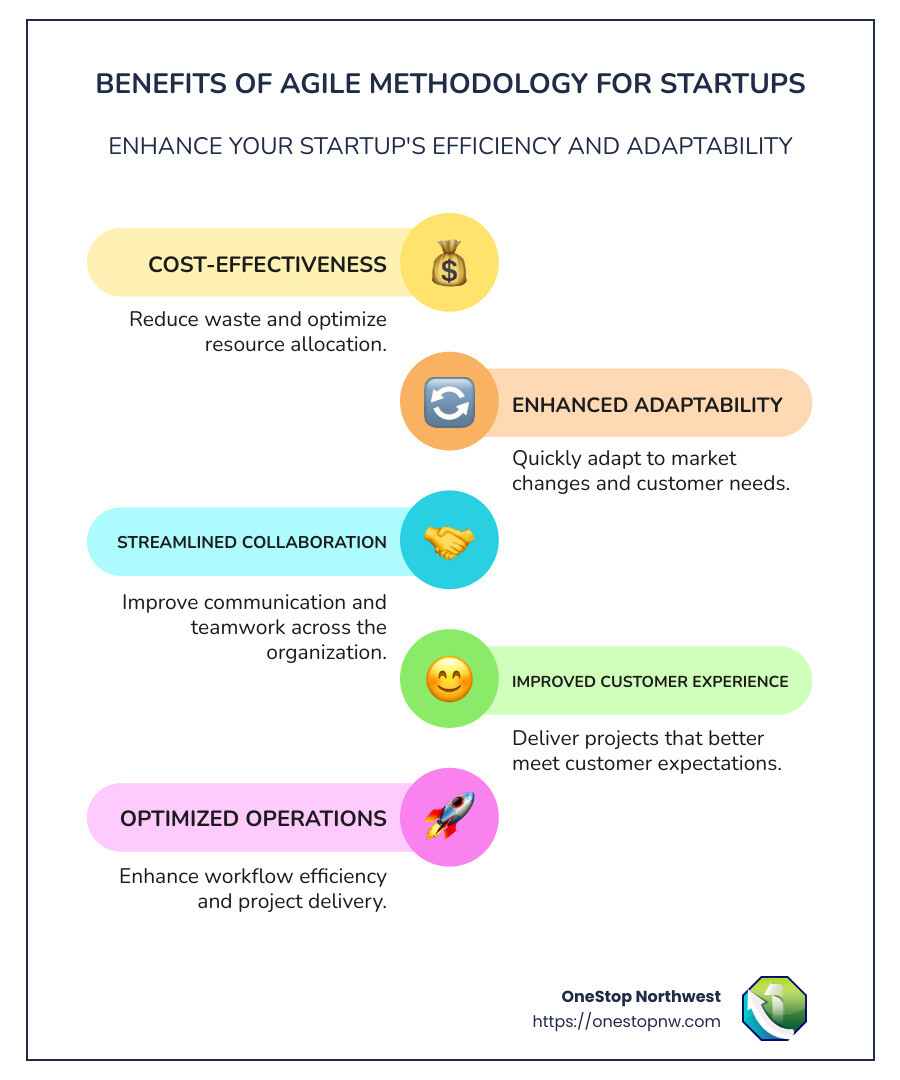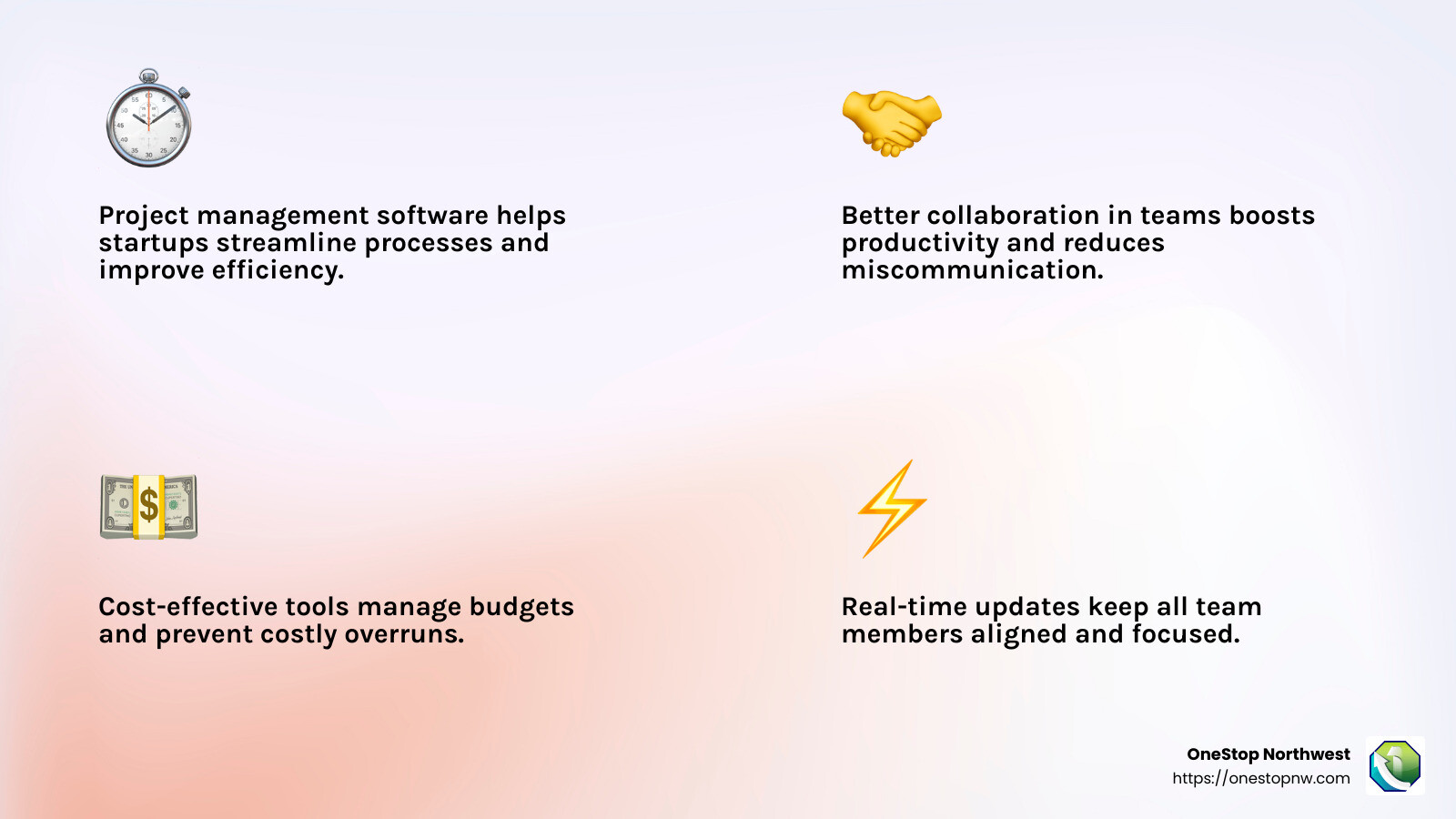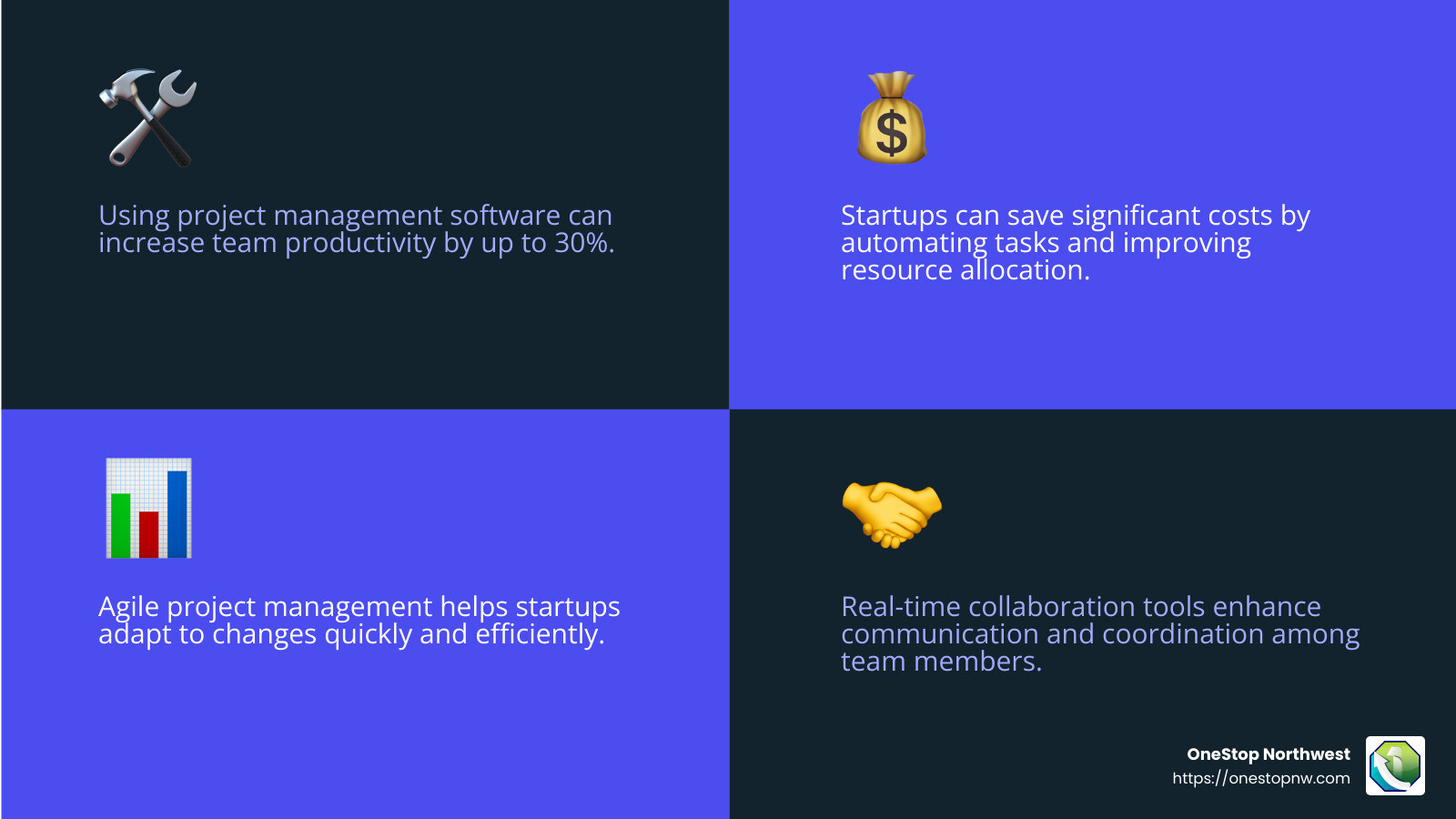Project Management Software for Startups: Top 5 Tools
Project management software for startups is an essential tool in today’s business world. For startups, effective project management can make a huge difference in achieving goals and staying competitive. Here’s a quick look at some of the best options out there:
- Asana: Ideal for cross-functional teamwork and maintaining transparency.
- Monday.com: Robust for customizing workflows and automating tasks.
- Airtable: Great for those who need flexibility and template-driven organization.
- ClickUp: Offers fantastic tools for goal tracking and task management.
- Trello: Known for its easy-to-use Kanban boards and clean interface.
Agile methodology is a core part of project management, especially for startups. It’s all about adaptation, collaboration, and iterative improvements. By breaking down projects into manageable “sprints,” Agile empowers teams to respond rapidly to change and maintain clarity in a collaborative environment. Startups that effectively adopt Agile practices can optimize processes, gain a competitive edge, and improve customer satisfaction.
I’m Dylan Cleppe, with over two decades of experience in using project management software for startups. At OneStop Northwest, our approach is rooted in aligning technology with business goals to streamline operations and drive efficiency.

Why Startups Need Project Management Software
Efficiency, productivity, and cost-effectiveness are three crucial reasons why startups should invest in project management software. Let’s break it down:
Efficiency
Startups operate in a high-pressure environment where every second counts. Project management software for startups helps streamline processes by organizing tasks, setting priorities, and automating repetitive activities. This means teams can focus on what truly matters—innovation and growth. With tools like Gantt charts and Work Breakdown Structures, startups can visualize their project timelines and ensure all tasks are accounted for. This leads to smoother operations and fewer bottlenecks.
Productivity
Productivity is the lifeblood of any startup. Project management tools boost productivity by facilitating better collaboration and communication. Features like real-time updates and shared workspaces keep everyone on the same page, reducing the chances of miscommunication and errors. As a result, teams can work simultaneously on different tasks without stepping on each other’s toes. This collaborative environment not only speeds up project completion but also improves the quality of work.

Cost-Effectiveness
For startups, managing budgets is a delicate balancing act. Project management software helps in avoiding costly overruns by providing tools for budgeting and resource utilization. By keeping track of expenses and optimizing resource allocation, startups can ensure they are getting the most bang for their buck. Tools like Zoho Projects offer budget-friendly plans that are loaded with essential features, making them a smart investment for startups looking to scale efficiently.
In summary, project management software for startups is not just a luxury—it’s a necessity. By enhancing efficiency, boosting productivity, and ensuring cost-effectiveness, these tools play a critical role in helping startups steer the challenging early stages of business development.
Next, we’ll explore the top project management software options that are particularly beneficial for startups.
Top 5 Project Management Software for Startups
Choosing the right project management software can transform how startups operate. Here’s a look at five top tools that are particularly beneficial for startups:
Asana
Asana stands out as a powerful tool for managing cross-functional teams. In startups, where multiple departments often work on the same project, Asana reduces silos by facilitating real-time collaboration. It acts as a central hub where marketing, sales, IT, and product teams can seamlessly coordinate their efforts.
With Asana, you can integrate with over 300 third-party applications, including HubSpot. This integration allows teams to track important context from deals and marketing campaigns directly within Asana tasks. It’s a perfect fit for startups looking to streamline updates and improve productivity.
Monday.com
Monday.com is known for its workflow customization capabilities. It serves as a central hub for tools, files, and business processes, making it easy for startups to manage diverse tasks. With its no-code automations, Monday.com simplifies repetitive tasks, freeing up time for more critical work.
The platform’s dashboards provide real-time data visualization, helping startups track progress and adjust priorities as needed. This flexibility makes Monday.com a favorite among startups that need to quickly adapt to changes in strategy.
Airtable
Airtable offers a unique level of customization, allowing startups to tailor the tool to their specific needs. Acting as a centralized hub, Airtable supports a wide range of templates for various departments like Marketing, Product, and HR. This makes it easy to set up everything from social media calendars to event plans.
Its ability to manage projects of all sizes and types makes Airtable an excellent choice for startups that require a flexible, yet robust project management solution.
ClickUp
ClickUp is a comprehensive tool that excels in goal tracking and task management. It provides a real-time collaboration environment, which is essential for startups working on tight deadlines. The “Everything” view in ClickUp allows teams to see tasks across all levels of the organization in one place, ensuring nothing falls through the cracks.
ClickUp’s customizable dashboards and automation features make it a versatile choice for startups aiming to boost efficiency and productivity.
Trello
Trello is perfect for startups seeking a straightforward layout. Known for its visual Kanban boards, Trello helps teams organize and prioritize tasks with ease. Automation features within Trello allow startups to set rules for most actions, reducing manual work and increasing efficiency.
Trello’s simplicity and intuitive interface make it ideal for startups that need a quick and easy way to manage projects without a steep learning curve.
These tools are designed to meet the unique needs of startups, offering features that support efficient operations, improve collaboration, and drive growth. Each software has its strengths, and choosing the right one depends on your startup’s specific goals and workflow requirements.
Next, let’s dig into the key features to look for in project management software.
Key Features to Look for in Project Management Software
When selecting project management software for startups, it’s crucial to focus on features that will improve your team’s productivity and collaboration. Here are the key features to consider:
User-Friendly Interface
Startups often operate with lean teams that juggle multiple responsibilities. A user-friendly interface is essential. It ensures that everyone, from tech-savvy developers to non-technical team members, can easily steer the software. This minimizes the time spent on training and allows your team to focus on what truly matters—growing the business.
Real-Time Collaboration
In today’s startup environment, real-time collaboration is a game-changer. Tools that offer this feature enable team members to work together seamlessly, regardless of location. With real-time updates, everyone stays on the same page, reducing miscommunication and enhancing efficiency. As noted by Forbes, effective communication is critical, especially for remote teams.
Kanban Boards
Kanban boards provide a visual way to manage tasks and workflows. They help teams see the progress of projects at a glance, making it easier to identify bottlenecks and adjust priorities. Trello, known for its intuitive Kanban boards, is a favorite among startups for its straightforward task management approach.
Gantt Charts
For startups tackling complex projects, Gantt charts are invaluable. They offer a timeline view of project schedules, helping teams track progress and dependencies. This visual representation makes it easier to plan ahead, allocate resources, and ensure that projects stay on track. Gantt charts highlight critical tasks, allowing teams to focus on what’s most important.
Integration Capabilities
Startups often rely on a suite of tools to manage different aspects of their business. Integration capabilities are essential for project management software to sync with existing applications like CRM, email, and file storage systems. Asana, for instance, integrates with over 300 apps, streamlining workflows and centralizing information.
By prioritizing these features, startups can choose a project management tool that not only fits their current needs but also scales as they grow. The right software will empower teams to work more efficiently, communicate effectively, and manage projects with greater ease.
Up next, we’ll explore the benefits of agile project management for startups, a methodology that can further optimize operations and improve customer experiences.
Benefits of Agile Project Management for Startups
Agile project management is a game-changer for startups. It offers a flexible and efficient way to manage projects, helping businesses adapt quickly to changes and deliver value faster. Let’s explore some key benefits of using Agile methodologies in startups.
Optimized Operations
Startups thrive on agility and efficiency. Agile project management helps optimize operations by breaking down projects into smaller, manageable tasks. This approach, often implemented through sprints, allows teams to focus on delivering incremental value. By regularly reviewing and adjusting priorities, startups can ensure they are always working on the most critical tasks.
For instance, using features that help teams identify and prioritize time-sensitive deliverables ensures that crucial tasks are completed on time. This focus on critical tasks helps startups avoid unnecessary delays and keeps operations running smoothly.
Streamlined Workflows
Agile methodologies promote streamlined workflows, which are vital for startups operating with limited resources. Tools like Kanban boards provide a clear visual representation of tasks at various stages. This visibility helps teams quickly identify bottlenecks and adjust workflows accordingly.
Moreover, Agile encourages regular feedback and collaboration, enabling teams to address issues promptly and improve processes continuously. This iterative approach ensures that workflows remain efficient and adaptable, even as project requirements evolve.
Improved Customer Experience
In the startup world, delivering a superior customer experience can set a business apart. Agile project management focuses on customer feedback and iterative improvements, ensuring that products and services are aligned with customer needs.
By incorporating customer feedback into the development process, startups can make informed decisions and refine their offerings. This customer-centric approach not only improves the quality of products but also builds stronger relationships with customers.
For example, Agile practices emphasize continuous testing and feedback, enabling startups to quickly adapt to customer expectations and market changes.
In summary, adopting Agile project management can significantly benefit startups by optimizing operations, streamlining workflows, and improving customer experiences. This methodology provides the flexibility and responsiveness needed to succeed in today’s dynamic business environment.
Next, we’ll tackle some frequently asked questions about project management software for startups, including insights into the best tools and the need for dedicated project managers.
Frequently Asked Questions about Project Management Software for Startups
What is the best project management tool for startups?
Choosing the best project management tool for startups depends on several factors, such as the specific needs of the business, team size, and budget. However, Height, Forecast, and Freedcamp are notable mentions that offer unique benefits custom for startups.
-
Height is known for its intuitive interface and flexibility, making it ideal for startups looking to streamline their operations with minimal learning curve. It combines task management with real-time collaboration to improve team productivity.
-
Forecast offers robust resource management and project planning features. It excels in helping startups predict project outcomes and allocate resources efficiently, ensuring projects stay within time and budget constraints.
-
Freedcamp is a cost-effective solution that provides a comprehensive suite of tools, including task lists, calendar views, and discussion boards. It’s perfect for startups that need a versatile tool without breaking the bank.
Do startups need a project manager?
The role of a project manager can be crucial for startups aiming for efficiency, productivity, and cost-effectiveness. A dedicated project manager brings structure and oversight to projects, ensuring that tasks are prioritized and resources are used efficiently. They help in setting clear goals, defining project scopes, and keeping the team aligned with the startup’s objectives.
However, not all startups may require a full-time project manager, especially in the early stages. In such cases, using project management software with built-in features for task automation and team collaboration can compensate for the lack of a dedicated manager. Tools like Zoho Projects and Nifty offer functionalities that help manage projects effectively, even without a dedicated project manager.
What is the most commonly used project management software?
Adobe Workfront, Smartsheet, and Jira are among the most commonly used project management software across various industries, including startups.
-
Adobe Workfront is popular for its comprehensive project management capabilities, including task assignment, resource management, and real-time reporting. It is particularly favored by larger startups that require advanced features to manage complex projects.
-
Smartsheet offers a spreadsheet-like interface that appeals to users familiar with Excel. It provides powerful collaboration and automation features, making it a versatile choice for startups that need to manage multiple projects simultaneously.
-
Jira is well-known in the tech industry, especially among software development teams. Its robust issue-tracking and Agile project management features make it ideal for startups adopting Agile methodologies to improve productivity and adapt to changes quickly.

In conclusion, the choice of project management software should align with the startup’s specific needs and goals. Whether it’s optimizing resource allocation with Forecast or leveraging Jira’s Agile capabilities, the right tool can be a game-changer for startup success.
Conclusion
In the world of startups, choosing the right project management tools can make all the difference between success and stagnation. At OneStop Northwest, we understand the unique challenges startups face. Our mission is to empower businesses with the right tools and strategies to steer these challenges effectively.
Project management software for startups is not just about organizing tasks. It’s about creating a seamless workflow, enhancing team collaboration, and driving efficiency. By leveraging the right tools, startups can streamline their operations, reduce manual tasks, and increase productivity. This is crucial because, as the saying goes, “Time is money,” and in the startup world, this couldn’t be truer.
Moreover, these tools facilitate collaboration, allowing teams to work together effortlessly, regardless of geographical barriers. This is especially important in today’s remote work environment. A good project management tool acts as a central hub where team members can share ideas, receive updates, and work towards common goals.
At OneStop Northwest, we offer comprehensive solutions custom to meet your startup’s specific needs. From custom web design to SEO optimization, our services are designed to support your business’s digital and physical presence. We believe that the right project management tool is a catalyst for your startup’s success, providing a holistic view of your processes and enabling informed decision-making.
Choosing the right tool requires careful consideration of your team’s needs and your startup’s goals. Don’t rush this decision—take your time to evaluate options, try free trials, and consider your budget. The right tool should feel like an extension of your team, intuitively supporting your workflows and driving your projects toward successful completion.
For more insights on how project management software can benefit your startup, visit our Project Management Software Benefits page.
In conclusion, with the right project management tools and strategies, your startup can achieve new heights of success. At OneStop Northwest, we’re here to guide you every step of the way. Let’s start on this journey together and watch your startup soar.


